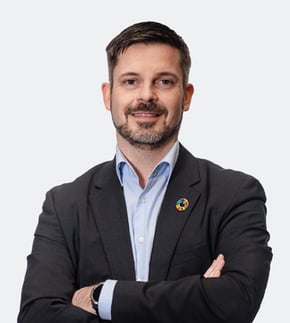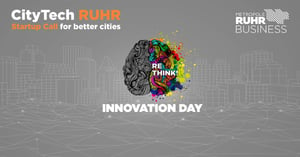The first edition of CityTech RUHR, Germany’s largest international smart city startup challenge, concluded with the successful development and implementation of pilot projects by three international startups in three participating cities of the Ruhr Metropolis. Three success stories reflect the high innovation potential that can be leveraged through the collaboration between cities and startups.
CityTech RUHR was launched in March 2020 as a prestigious innovation sprint to identify and implement solutions to solve specific challenges of participating cities from the Ruhr Metropolis.
More than 100 international startups from 27 countries on 4 continents applied with their solution ideas to solve the challenges issued by the cities of Bochum, Bottrop, and Hagen. Three finalist startups were selected in June, following a 4-month piloting phase that started in July and was successfully concluded at the end of October in all three cities.
Three success stories: The smart city pilot projects
In its first edition, the CityTech Ruhr challenge has proven to be an inspiring and innovative format that enables fruitful collaboration between local governments and international smart city startups to tackle existing urban challenges in different verticals and to drive smart city innovation. All three cities and their partnering startups describe not only a positive open and professional working atmosphere but are also satisfied with the achieved results. The wish to continue the project collaboration with the selected startups and a strengthened openness for projects with startups reflect the positive impact of the challenge.
Digitizing and automating the building permit application process in Bochum
Together with the City of Bochum, London-based startup Kyanite360 developed and implemented a digital platform to automate a BIM-based planning and building regulations compliance control process for building permit applications. This compliance check works like a spell checker, but for building design, and is integrated with an Artificial Intelligence back-end to break down written code, into computer code and reasoning algorithms.
„The CityTech pilot project proves that the pre-check for building regulations compliance can be digitized based on BIM data. The project lays a solid foundation for processing building permit applications automated and digitally in the future, enabling a faster and more efficient overall application process“, concludes Thomas Eiskirch, Lord Mayor of the City of Bochum.
The City of Bochum and Kyanite360 discuss a continuation of their successful collaboration to fully automate the building permit application process and to achieve the overall project vision.
“The CityTech RUHR program provided us with the platform to launch and validate our solution with customers and users. We are now planning to develop the solution to full commercial scale and to expand the offering to all cities in the Ruhr Metropolis, the state of Nordrhein-Westfalen, and the other 15 German states”, says Paul Marais, CEO of Kyanite360.
Big Data for Inner City Revitalization in Bottrop
The City of Bottrop worked with the Israeli startup Placense to generate, process, and analyze big data of citizens and inner city visitors (catchment, footfall, movement, purposes) to deduct new and check the efficiency of existing measures for inner city revitalization. The data is used to make better-informed decisions about actions aimed at increasing the number of visitors in the city centre to strengthen the local economy and leisure activities.
As part of the pilot, we were able to highlight Bottrop residents' shopping trends as well as analyze why and when residents from surrounding cities are coming to Bottrop. We delivered visualizations of popular routes and locations within the city area and defined visitation and retention KPIs that are helpful for the municipality to track continuously”, summarizes Avi Hadas, Co-Founder and COO of Placense, the results of the pilot project. He also points out the benefits for the startup: “The pilot reinforced our assumption that Placense can cater to the needs and pain points of municipalities. We have refined use cases that can be rolled out with multiple municipalities, with only minor customizations.”
For the City of Bottrop, the successful pilot project has not only achieved the main goal but also resulted in organizational learning outcomes: “The pilot project has helped us to get a deeper understanding of how “big data” can help us as local government to make better-informed decisions and to use our resources more smartly. In addition, we have learned that we need a new mindset in terms of asking the right questions and understanding the opportunities and limitations of data generation and analysis. For us, the CityTech RUHR Challenge was a good starting point for the use of big data – which we plan to use even more in the future”, states Dorothee Lauter from the Bottrop Economic Development Department.
The “Hagen Heroes App”: Promoting Sustainability in Hagen
In the third pilot project, the City of Hagen and German startup company Changers developed the “Hagen Heroes App” that motivates residents to walk and cycle more often, use public transport and take part in healthy and sustainable activities. In friendly competitions, the users learn more about their impact on their health and the environment. Users of the app earn Hero Points for participation and saving CO2, which they can redeem for tree plantings, discount vouchers, and exciting raffles.
For this pilot project, Changers worked with 3 partners, the first being the city administration of Hagen itself, then the Hagen Agentur, which supports business and innovation in Hagen, and Mark-E, the local energy provider.
“In the CityTech RUHR project, we took on a joint challenge to find the best digital solution for our residents. This form of intersectoral collaboration as well as the partnership with the startup Changers was highly professional and goal-oriented. This positive project experience is important for future collaboration projects”, states Christopher Kuppig of the local energy provider Mark-E. “Through CityTech RUHR, we have also learned about different possible solutions to promote the use of sustainable transport options in Hagen”, adds Nicole Schulte from the City Department for Environment.
Daniela Schiffer, Managing Director of Changers explains: “The cooperation went very well and within a very short period, we were able to kick off a great app and find attractive partners in the region to support us. We think this is a great success”. She adds a challenge for the other municipalities in the Ruhr Metropolis: “We are looking forward to setting up a challenge with all 53 communities within the Ruhr region to see who saves more CO2 and who becomes the real Ruhr Climate Hero.” With the “Hagen Heroes App”, the City of Hagen is well-positioned to take on this challenge.
Results Presentation at Smart City Live 2020 and during Ruhr Innovation Day
A preview of the challenge results was presented on November 18 during the Smart City Live 2020 side event “Smart Cities Germany”, organized by Germany Trade & Invest (GTAI). Smart City Live 2020 is the digital edition of Smart City Expo World Congress, the world's leading event for smart cities. The detailed CityTech RUHR results were presented at the Ruhr Innovation Day on December 2, 2020.
About the Ruhr Metropolis & Business Metropole Ruhr
The metropolitan Ruhr Area is the largest urban area in Germany and the third largest in the European Union. It consists of 53 cities within Ruhr and it is strategically located in a very important industrial part of the country.
Business Metropole Ruhr GmbH (BMR) develops and markets the Ruhr metropolitan area as an economic region. It bundles the economic interests of the 53 cities and communities in the area. The goal is to enhance the competitiveness of the Ruhr region. This includes implementing and continuously evolving an overall economic strategy for the Ruhr metropolitan area as well as promoting the image of the area as a high-performing and innovative region, both nationally and internationally.

